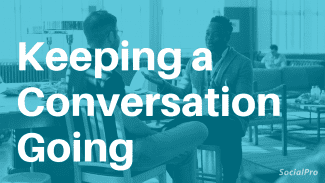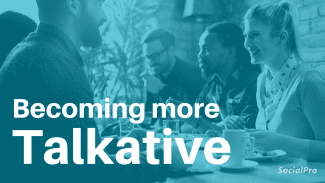“Most of my conversations feel forced. I usually end up sticking to small talk or giving one-word answers. I don’t want people to think I’m antisocial, but I’m so afraid I’ll say something stupid when I talk. How do I get better at talking to people?”
Do you have a blooper reel of painfully awkward conversations in your head?
If so, you might go out of your way to end conversations quickly to avoid another social disaster. Because improving conversation skills takes time and practice, avoiding social interactions can work against you. If you’re serious about wanting to improve your social skills, you will need to talk to more people, start more conversations, and become willing to open up.
You can’t get from awkward to awesome without a few bloopers, so don’t get discouraged if some of your early conversations are duds. Instead, see these as necessary practice runs, preparing you for better, more natural conversations in the future. With practice, your conversations will begin to flow more easily and naturally.
What do people talk about?
Almost any topic you can think of can make for good conversation. Every day, thousands of thoughts pass through your mind. Many of these can be great conversation starters. People often talk as a way of getting to know each other, so family, friends, work, goals, and hobbies are popular topics.
How to get better at talking to people
1. Stop using safety behaviors
Because talking to people makes you feel nervous or awkward, you might use “safety behaviors” as a crutch. According to research, these can worsen your anxiety and can close lines of communication.[1, 2] You communicate the most clearly when you are able to get out of your head, be present, and think things through.
Here’s a list of safety behaviors that can become a dead-end during a conversation:[1]
- Avoiding conversations and small talk
- Giving short, one-word answers
- Rehearsing lines or giving scripted responses
- Frequently checking your phone during a conversation
- Not opening up or talking about yourself
- Being overly polite or formal
- Sticking to small talk
- Rambling on to avoid silence
When you use these social crutches too often, you become dependent on them and become less confident in your ability to get through a conversation without them. You also reinforce your insecurities and fears, even when they aren’t rational. Each time you have a conversation without these crutches, you prove to yourself that you don’t need them.
2. Get out of your head
People who struggle with social anxiety often describe having negative thoughts like, “What if I say the wrong thing,” or, “I probably sound so dumb,” or “What do people talk about?” The more you focus on these thoughts, the more anxious you get. These thoughts also keep you in your head, distracting you from the conversation you are trying to have.[2]
Use one of these skills to interrupt negative thoughts:[2, 3]
- Refocus: Negative thoughts try to demand your attention by getting mean, loud, and scary. Like a child having a tantrum, the worst thing you can do is give in to their demands. Take your power back by intentionally ignoring these thoughts and give the person you are talking to your full attention.
- Look for the good: When you are insecure, you unconsciously look for clues that other people don’t like you. This can lead you to find proof even when it isn’t there. Reverse this habit by intentionally looking for good signs that people like you and want to talk.
- Use mindfulness: Mindfulness means being fully present in the here and now, instead of being distracted or stuck in your head. You can use mindfulness to interrupt negative thoughts by using one or more of your 5 senses to become more aware of where you are.
3. Find a comfortable topic
Because there are so many ways to start a conversation, it can be difficult to find the right thing to talk about. Until you get to know someone, you probably want to avoid topics that are too personal or controversial, even when you are the one doing the sharing. Oversharing with someone you just met can lead to regret and can also make the other person feel uncomfortable.
| Uncomfortable topics | Comfortable topics |
| Religious or spiritual beliefs | Activities, hobbies, and interests |
| Politics and controversial current events | Current projects at work or home |
| Painful memories or experiences | Casual observations |
| Secrets or deeply personal details | Interesting stories and experiences |
| Relationship problems | Goals and plans for the future |
| Gossip or talking badly about others | Similar beliefs and opinions |
| Personal insecurities | Shows, movies, and pop culture |
| Strong feelings and controversial opinions | Life hacks or solutions for common problems |
4. Find an opening
Once you have a topic in mind, the next step is to find a way to turn it into a conversation. You want to start conversations in ways that feel natural instead of forced. Sometimes, you can even start with small talk and then smoothly transition into a more in-depth discussion. The tips listed below can help you find ways to effortlessly start conversations and keep them going:[4]
- Ask questions to get beyond small talk
If someone asks, “How are you?” try going off-script by talking about a project you are working on or something funny that happened earlier this week. If you ask how someone is and they respond, “Doing well, thanks.” Follow up with another question like, “What have you been up to?” or, “I’m looking for a new show. Any recommendations?”
- Get more personal with coworkers
If you tend to get stuck talking shop with coworkers, try getting a little more personal by talking about something you are working on at home or plans you have for the weekend. This can help them feel more comfortable opening up on a more personal level.
- Make an observation
People appreciate being noticed, so pay attention to details about other people. If they got a haircut, tell them it looks great. If they are in a great mood on Monday, mention it and ask them how their weekend was.
5. Circle back to a previous topic
Sometimes, you can continue a previous conversation instead of feeling the need to start a brand new one. Think back to recent conversations with someone and see if there is a way to circle back to continue your conversation.
For example:
- If someone is getting their home renovated, ask how it is going or to see pictures
- If a friend mentioned they are trying to buy a new car, ask them how the search is going
- If someone recommended a show and you watched it, follow up to talk about it
- If a coworker mentioned getting lunch sometime, stop by their office to nail down a day
6. Look for positive social cues
Social cues are subtle verbal and non-verbal signs that can help you know what to say and not say during a conversation. Think of positive social cues as green lights that help you know when a person is interested in a topic. Topics that interest people tend to be more enjoyable, so seeing a green light is a signal to keep going in that direction.
Here are social cues that indicate someone is enjoying a conversation:[5]
- Leaning towards you
- Smiling, nodding, or seeming interested when you speak
- Giving you their full attention
- Seeming eager to speak
- Becoming more expressive and use their hands
- Opening up and sharing more about themselves
- Expressing more enthusiasm
- Good eye contact
7. Watch for negative social cues
Negative social cues are signs that a person is uncomfortable, bored, or doesn’t want to talk. These cues can be thought of as red lights because they signal that it is best to stop, change topics, or end the conversation. When you hit a red light in a conversation, be friendly and say, “You seem really busy. I’ll catch up with you later.” This lets them off the hook and leaves the conversation open to be continued at another time.
These social cues indicate that you should change directions or end the conversation:[5]
- Avoiding eye contact
- Giving short, one-word answers
- Appearing distracted, zoned out, or checking their phone
- Fidgeting and not being able to sit still
- Crossing their arms or seeming defensive
- Shutting down or becoming quiet
8. Practice joining group conversations
In a large group, it can feel impossible to get in a word without interrupting or talking over someone. People who are more outgoing often dominate in group conversations, which can be hard if you are someone who is naturally more reserved or quiet. Include yourself in group conversations by trying these approaches:
- Cue the speaker: Making eye contact with the person who is speaking can be a social cue that lets them know you want to say something. You can also try holding up a finger or saying their name to get their attention.
- Interrupt and apologize: There are some situations where it will be impossible to get a word in without interrupting. If you’ve tried the other approaches and can’t get a turn, it is OK to interrupt, apologize, and then speak your mind.
- Speak up: Groups can be noisy, so remember to speak loudly and clearly to make sure your voice is heard.
9. Ask questions and open up when you’re on a date
When you are on a date with a guy or girl you like, you might feel extra pressure to make conversation. Use some of the simple strategies below to keep yourself calm, cool, and collected on a date:
- Change the goal: The goal of a first date isn’t to find your soulmate or win someone over. It should be to get to know someone, find things in common, and figure out if there is mutual interest in a second date. Remembering this can keep you calm and level-headed.
- Ask questions: Asking questions that get your date talking and take some of the pressure off of yourself. Try asking about their work, what they went to school for, what they do in their free time, or check out this list of 50 questions to ask on dates.
- Open up: Opening up is a necessary step towards any real relationship, and doing it early is a good compatibility test. Figure out if you have anything in common with them by talking about your interests, hobbies, or goals and gauging their responses.
10. Adjust your approach when calling or texting
Without being able to see someone’s reactions in real-time, it can be hard to figure out if a conversation is going well. This can make conversations on the phone or through text more difficult. By using some of the simple tips below, you can make phone conversations and texts flow more smoothly:
- Wait for the right time to answer the phone or respond to a text (i.e., not when your toddler is screaming or when you are running late to a work meeting).
- Ask if it’s a good time to talk when calling someone and if not, ask them to call you back.
- End phone conversations if it seems like a bad time or if they come to a stall.
- Explain slow response times by saying, “I’m thinking,” “Hold on a sec,” or, “I’m about to go into a meeting. Text you after” to avoid miscommunication.
- Use emojis and exclamation points in texts and emails when you want to emphasize something or express an emotion.
- Opt for a phone or video call when you have something important or sensitive to discuss, instead of texting or emailing.
Final thoughts
If you want to improve your social skills, you will need to make a consistent effort to socialize and talk to more people. While it might start off a little awkward, don’t let yourself get discouraged. The more you practice, the easier it will become to start conversations and keep them going in ways that feel natural. Over time, your conversation skills will improve, and you will find conversations easier and more enjoyable.













sooo what do i do if i have high functioning anxiety and i cannot do any of this?
this is BS
I have high functioning autism and I have trouble starting and keep conversations going. This blog is very insightful. Thanks!
Interesting, i always feel like starting a conversation with a stranger is very hard and in most cases i dont do it because its terrifying